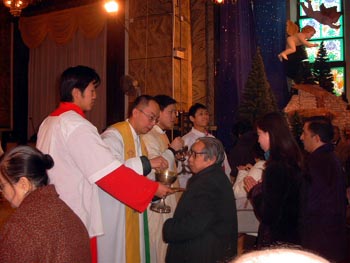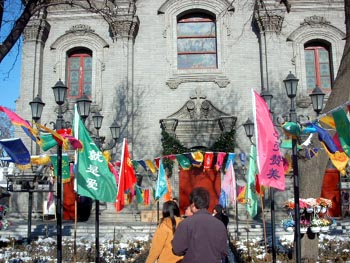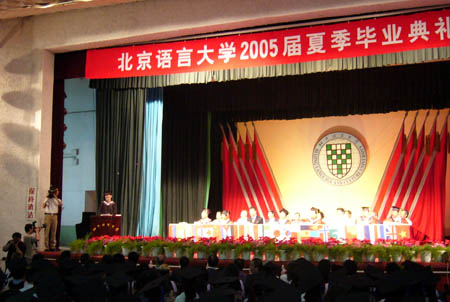

The Mass in the church
Ariel view of the church decorated for Christmas
|about Bernhard Wilden| |study in China| |last stay at home| |last days of his life| |message about his death|
|Beijing Dec 06| |reactions| |recherche| |Beijing Nov/Dec 07| |meeting with PSB| |summary| |links|
Bernhard began his studies in Beijing at the BLCU in September 2002. At Christmas of that year we flew to Beijing to spend the holiday with him and to join him for Christmas Mass in the Catholic South Cathedral of Beijing (Nantang Cathedral).
 |
 |
|
The Mass in the church |
Ariel view of the church decorated for Christmas |
The church was very crowded, more than overflowing. To our surprise, the Mass was celebrated in English, so I could understand what the priest spoke about during his homily. We were pleased to learn that at the midnight Mass 42,000 people attended filling the church and spilling out onto the roadway. In addition to the Catholics present to mark this holy night, the mayor of Beijing and important Buddhist representatives of the city and other notable personalities were also present. When we learned of this great number of people attending, we asked if it could be so. Indeed it was: 42,000 visitors had come to the Mass. We also learned that a good ten percent of the population now professes to be Christian, a number that continues to grow. Normally the Masses are celebrated in the Chinese language, sometimes in Latin, but for Christmas that year English was used by the priests.
Bernhard always used to fly home to Germany for his semester holidays, and about twice each year we visited him in Beijing, so we always remained in close contact. In addition, we exchanged almost daily e-mails, sometimes longer texts, sometimes only a few words. When he left for China, he was casting an anchor in China, which came easy to him and soon he succeeded in assimilating there. He also enjoyed exploring China from the first day after his arrival there. He didn't have any German friends or contacts but rather did establish friendships with students of other nationalities, especially with Chinese. Also, he had contact with the relatives of his female Chinese teacher from Cologne who lived in Beijing.
In the summer of 2003 Bernhard met a fine Chinese girl, and before too long, the two began to plan for a future together. He easily integrated into the Chinese life, ate only Chinese food and maintained great relationships with a lot of people in Beijing. In particular, of course, he became very close to his girlfriend's family making a transition into Chinese culture, language, and lifestyle easy.
About the middle of the year 2004, Bernhard's e-mails began to exhibit an understanding of the real social problems present in China. We could see that he had become well-informed about the real political situation there, especially in regards to the Communist Party of China and their political system.
We must assume that he also got information at this time about the problems facing Christianity there, especially for Catholic Christians in China. On 24 April 2004 Bernard wrote to his parents about the situation:
| Often, I talk with local
Chinese and can see their real attitude towards the
government and party. There is clearly a negative feeling
amongst the people, but the majority of the people at
least publicly continue to support the regime. The
overall picture is that the Chinese people support their
government voluntary, are not forced to do so, and submit
to the leadership. It is also the general feeling that
there are "too many people" in China, and it
can therefore be understood why they support the official
one-child policy. International the ordinary Chinese feel
that they are well-represented by their government and
they see patriotism as something positive and a
desirable; a reflection of loyalty to the party. So
generally, nobody feels suppressed here. The Communist
system has poisoned their hearts and souls. The only
beneficial thing for them is that because many did not
dare speak out in criticism against the government and
the communist party that they were free of suppression. ... The general opinion is defined by the (communist) party and "Marxism" (as communism here is called). Each student must pass examinations on the Marxist doctrine, passing at least one such test. The university speaks a great deal about economics but it is also still a communism philosophy and view of life that dominates everything. Science is altered to reflect their world outlook and the slogans remain now as in years past. Almost never do the officials attempt to answer any questions outside of this thought. I do not yet know whether or not it would be possible here to live as both a good Chinese and as a good Christian without agreeing to an embrace of communist predications contrary to a personal belief of in God and an embrace of the dogma of Christian faith. And also last of all, I read something, which could be interpreted as pointing out that every Chinese (and church officials here agree) must sign a document known as the "three-self" pledge which includes a formal separatism from the Pope. Whether this is really so, I do not know. In the end, most of all, I do not want anyone who is a member in the official church to deny the faith, even if he agrees to sign the document. But I reflect about it, but believe that by signing he does not do so. |
On the same day evening, Bernard wrote in an E-Mail:
| I believe that communism is one of the worst things of all time on our planet. |
This consideration occupied his mind from then on in a most intense way. Bernhard said at the time that he believed that the Chinese government does not respect human rights. In my replies to him, I would ask him on what his opinion was based. He lived in China and he could say certainly something very concrete about that, but my personal impression of China was that the Chinese lived as freely as the people in Germany. From my own experiences while visiting there, I felt subject to no limitations of any kind; we had no language or other difficulties, and felt no discomfort about being there because Bernhard helped us to assimilate well in regards to translations and all other things; everything was easy for us. Bernhard maintained his opinions but did not offer a clarification or examples. From that time forward, again and again, he also sharply criticized the Chinese on their abortion policies, permitting only one child per couple and forced abortions for all subsequent pregnancies.
On 11 June 2005 Bernhard wrote:
| Today I have submitted my thesis to a priest, whom I know because he sometimes carries out talks on the faith, which I often have attended. |
Bernhard refers often to his "religious training". Perhaps he was speaking of courses in preparing for baptism. Bernhard had a great deal of contact with Chinese Christians, which we know from his emails, letters and telephone conversations. Because this interested me, I asked him on a few occasions about the underground churches wanting to know if they really exist and where they can be found, but Bernhard always remained silent or gave evasive answers.
Foreigners in China are prohibited from engaging in missionary activities, and may not even bring into the nation any religious material except for items for personal use while there. Chinese Christians must first obtain formal state permission before making contact with foreigners; this according to the rule known as "the independence of religious communities to be preserved".
Bernhard received his Bachelor of Arts (BA) degree from BLCU in the summer of 2005. His thesis compared a 3000-year-old indigenous spiritual movement (now almost forgotten) with modern Chinese Christianity; in particular it addressed the differences and content of the term "love".
We travelled to Beijing to be present for his examination ceremony and then spent a few wonderful days together before we all returned home to Germany since Bernhard now had his normal semester break.
In 2005, at Leipzig (Germany) Bernhard took exams to become a certified translator for Chinese, specifically for professionals in business and economics. He successfully passed these exams and proceeded to be admitted to postgraduate studies, in the Master's degree program, in China in the field of "International Business". At the same time Bernhard also intended to begin (in autumn 2005) preparation for an exam for certified interpreters in Chinese and preparing for the highest level of the state Chinese language test (HSK examination).

Bernhard (left) at the speaker’s desk during the speech as a representative of the foreign students during the examination ceremony at BLCU